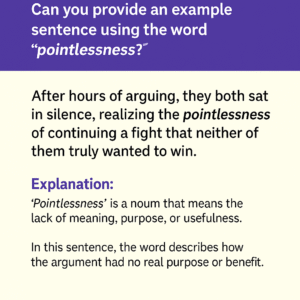Sentence Using “Pointlessness” with Examples-Grammar Puzzle Solved-28
✅ Example Sentence Using Pointlessness:
Here is the sentence using pointlessness.
After hours of arguing, they both sat in silence, realizing the pointlessness of continuing a fight that neither of them truly wanted to win.
🧠 What Does “Pointlessness” Mean?
The word pointlessness is a noun that refers to the lack of meaning, purpose, or usefulness. In other words, it describes situations where actions or feelings seem to lack direction or value. When this happens, something feels pointless because it doesn’t lead to any valuable result or benefit. Moreover, it conveys the idea of futility—where effort, emotion, or time is spent with no clear goal or outcome. Ultimately, the term highlights the emptiness or ineffectiveness of an action or situation.
📚 Why This Sentence Works:
This example captures an emotional turning point. At first, both individuals are engaged in an intense argument. However, as emotions cool and clarity begins to emerge, they come to a shared realization: the disagreement offers no constructive result. It neither brings understanding nor fosters healing or a meaningful solution. As a result, they recognize the pointlessness of continuing.
In this context, the word conveys more than just a definition—it expresses a deeper emotional and relational truth. Often, arguments escalate due to ego or pride rather than a genuine desire for resolution. By using pointlessness, the sentence highlights emotional maturity and the ability to recognize when energy is being wasted.
🔄 More Examples for Clarity:
-
The employee questioned the pointlessness of printing hundreds of reports no one ever read.
-
The repeated use of the same failed strategy clearly showed the sheer pointlessness of the meeting.
-
He stared at the broken device, overwhelmed by the pointlessness of trying to fix it one more time.
✅ Quick Tip:
Use pointlessness when describing actions, ideas, or events that lack direction, outcome, or meaning. It’s beneficial in emotional or philosophical contexts.
🎯 Conclusion:
The word pointlessness adds depth to your vocabulary. Moreover, it allows you to express when something feels empty, futile, or lacking in value. Whether you’re reflecting personally or narrating a story, this word helps you articulate frustration, disillusionment, and even moments of sudden clarity. Ultimately, it strengthens emotional expression and enhances your writing precision.

Grammar Puzzle Solved:
https://grammarpuzzlesolved.englishlitnotes.com/capitalize-common-nouns/
Letter to Brother about Improving Health:
https://englishwithnaeemullahbutt.com/2025/04/26/letter-to-brother-about-improving-health/
The History of English Literature: https://englishlitnotes.com/category/history-of-english-literature/
For grammar lessons, visit ChatGPT to explore the platform and interact with the AI: https://chat.openai.com
Discover more from Grammar Puzzle Solved by Naeem Ullah Butt
Subscribe to get the latest posts sent to your email.

